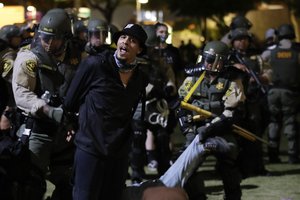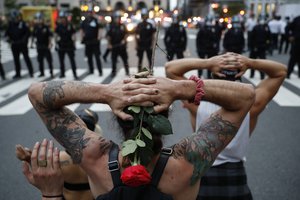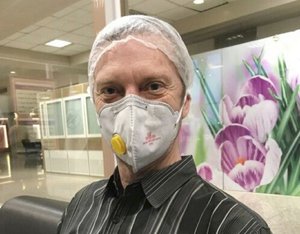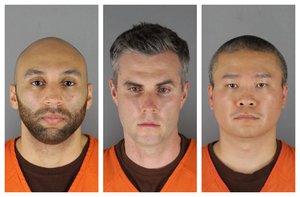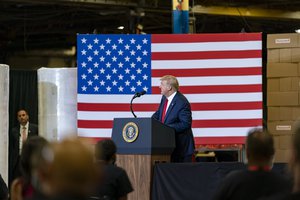
Sidney Lanier
Sidney Clopton Lanier (February 3, 1842 – September 7, 1881) was an American musician, poet and author. He served in the Confederate army, worked on a blockade running ship for which he was imprisoned (resulting in his catching tuberculosis), taught, worked at a hotel where he gave musical performances, was a church organist, and worked as a lawyer. As a poet he used dialects. He became a flautist and sold poems to publications. He eventually became a university professor and is known for his adaptation of musical meter to poetry. Many schools, other structures and two lakes are named for him.
Biography
Sidney Clopton Lanier was born February 3, 1842, in Macon, Georgia, to parents Robert Sampson Lanier and Mary Jane Anderson; he was mostly of English ancestry. His distant French Huguenot ancestors immigrated to England in the 16th century, fleeing religious persecution. He began playing the flute at an early age, and his love of that musical instrument continued throughout his life. He attended Oglethorpe University, which at the time was near Milledgeville, Georgia, and he was a member of the Sigma Alpha Epsilon fraternity. He graduated first in his class shortly before the outbreak of the American Civil War.
Lanier, Sidney Filmography
-
1979, role: actor , character name: Raymond-The Butler
-
1979, role: producer
-
1977, role: actor , character name: Rossi
Matching books:
Famous quotes by Sidney Lanier:

Suddenly
We make our paths ,
We're independent .
We dump our boyfriends.
And we do our hair anyway we would like .
We figure out , that we are attractive .
And we look around ,
And now we loved to live the single life .
And then we tell ourselves we'll never fall in love
again .
But then he comes around and suddenly we understand ,
That we have never really been in love before.
And suddenly I know what all the love songs that they
write are all about ,
And suddenly I dont care if its right or wrong as long
as he's around ,
And suddenly the things that used to sound cliche are
perfectly right in your eyes .
Perfectly right with this guy .
I know its wierd ,
But we are connected .
And in some strange and crazy way I think ,
That we have always been .
And now he's here ,
And he says he loves me .
And it feels so right ,
And In fact it feels so good that I can't sleep at
night .
But I just told myself I will not fall in love again .
But he just came around and then he made me understand
That I have never really been in love before.
And suddenly I know what all the love songs that they
write are all about ,
And suddenly I dont care if its right or wrong as long
as hes around ,
And suddenly the things that used to sound cliche are
perfectly right in my eyes .
Perfectly right when he's here .
And yes ,
I know you might get impatient .
But look around ,
He might be walking right in front of you .
And if he touches you and you feel your skin is burning
Kisses you and you feel your stomach turning ,
He's the one ,
He is the one .
And suddenly I know what all the love songs that they
write are all about ,
And suddenly I don't care if its right or wrong as long
as your baby's around ,
And suddenly the things that used to sound cliche are
perfectly right in your ears .
Perfectly right when he's there .
Perfectly right when he's there .

Sidney Lanier
Sidney Clopton Lanier (February 3, 1842 – September 7, 1881) was an American musician, poet and author. He served in the Confederate army, worked on a blockade running ship for which he was imprisoned (resulting in his catching tuberculosis), taught, worked at a hotel where he gave musical performances, was a church organist, and worked as a lawyer. As a poet he used dialects. He became a flautist and sold poems to publications. He eventually became a university professor and is known for his adaptation of musical meter to poetry. Many schools, other structures and two lakes are named for him.
Biography
Sidney Clopton Lanier was born February 3, 1842, in Macon, Georgia, to parents Robert Sampson Lanier and Mary Jane Anderson; he was mostly of English ancestry. His distant French Huguenot ancestors immigrated to England in the 16th century, fleeing religious persecution. He began playing the flute at an early age, and his love of that musical instrument continued throughout his life. He attended Oglethorpe University, which at the time was near Milledgeville, Georgia, and he was a member of the Sigma Alpha Epsilon fraternity. He graduated first in his class shortly before the outbreak of the American Civil War.
Latest News for: Sidney Lanier
Travis McMichael used a racist slur just after Ahmaud Arbery was shot, according to the person who filmed the encounter
Movement to change names of Montgomery schools with Confederate ties gains momentum
Lanier boys basketball coach Brian Williams steps down
Cross adds another to impressive signing class for Troy men's basketball
 Dothan Eagle
21 May 2020
Dothan Eagle
21 May 2020
Man Who Filmed Ahmaud Arbery's Death Arrested on Murder, False Imprisonment Charges
She got the ring and he said, ‘I gotta go, the Bama game is about ...
Kori Walker offers a blueprint for success at Decatur
 Decatur Daily
17 May 2020
Decatur Daily
17 May 2020
Gregory McMichael, ex-police officer charged with killing Ahmaud Arbery, had service weapon suspended in 2019
Who was Ahmaud Arbery? Friends, family remember shooting victim as ‘humble guy’
A look at Lanier tennis player Malik Stinson
Ahmaud Arbery Murder Suspect Gregory McMichael Spent 8 Years Working as Chief Investigator With No Arrest Powers
Check out these photos of Sidney Lanier High School and students through the years
- 1
- 2
- Next page »

